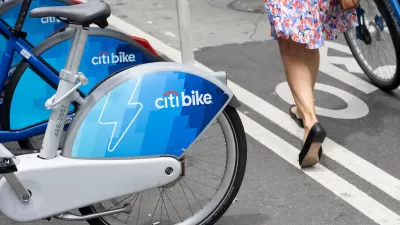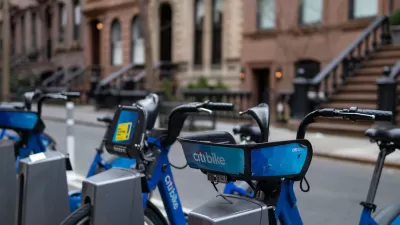Few details are available about just how troubled the financial situation is at the country’s most recognizable bikeshare program, but it’s possible that Citi Bike will need a cash infusion or a new model to stay in business.
Laura Kusisto, Eliot Brown, and Andrew Tangel share the distressing news about the financial situation of Citi Bike, New York City’s bikeshare program. Although few details are available, here’s what has been reported so far:
- “The program's leaders have approached officials in Mayor Bill de Blasio's administration about raising Citi Bike's rates…”
- “One issue is that Citi Bike has proved more popular than expected with annual users who generate comparatively little revenue. Some 99,000 people pay $95 a year plus tax to be able to use the bikes for 45 minutes at a time.”
- “The potential for far greater revenue, however, is with short-term users. Many of those were expected to be tourists, and they haven't used the bikes nearly as much as officials had anticipated, people familiar with the matter said.” According to the article, “managers don't believe it can survive if it doesn't become more appealing to tourists and expand to new neighborhoods.”
- Finding additional sponsors has proved challenging because the program has become so closely associated with its eponymous supporter, according to a person familiar with the matter.
The article has a lot more information and analysis of Citi Bike’s financial situation, including a discussion of whether Alta Bicycle Share, the company that runs Citi Bike through a subsidiary, will have to seek public money to stay afloat. So far, it seems, the program has only requested permission from the city to raise rates.
After initial delays, Citi Bike had been touted as a model of bikeshare success, while bikeshare programs in other parts of the country and in London have struggled.
FULL STORY: Citi Bike, Needing Millions of Dollars, Looks for Help

Alabama: Trump Terminates Settlements for Black Communities Harmed By Raw Sewage
Trump deemed the landmark civil rights agreement “illegal DEI and environmental justice policy.”

Study: Maui’s Plan to Convert Vacation Rentals to Long-Term Housing Could Cause Nearly $1 Billion Economic Loss
The plan would reduce visitor accommodation by 25% resulting in 1,900 jobs lost.

Why Should We Subsidize Public Transportation?
Many public transit agencies face financial stress due to rising costs, declining fare revenue, and declining subsidies. Transit advocates must provide a strong business case for increasing public transit funding.

Paris Bike Boom Leads to Steep Drop in Air Pollution
The French city’s air quality has improved dramatically in the past 20 years, coinciding with a growth in cycling.

Why Housing Costs More to Build in California Than in Texas
Hard costs like labor and materials combined with ‘soft’ costs such as permitting make building in the San Francisco Bay Area almost three times as costly as in Texas cities.

San Diego County Sees a Rise in Urban Coyotes
San Diego County experiences a rise in urban coyotes, as sightings become prevalent throughout its urban neighbourhoods and surrounding areas.
Urban Design for Planners 1: Software Tools
This six-course series explores essential urban design concepts using open source software and equips planners with the tools they need to participate fully in the urban design process.
Planning for Universal Design
Learn the tools for implementing Universal Design in planning regulations.
Smith Gee Studio
Alamo Area Metropolitan Planning Organization
City of Santa Clarita
Institute for Housing and Urban Development Studies (IHS)
City of Grandview
Harvard GSD Executive Education
Toledo-Lucas County Plan Commissions
Salt Lake City
NYU Wagner Graduate School of Public Service





























